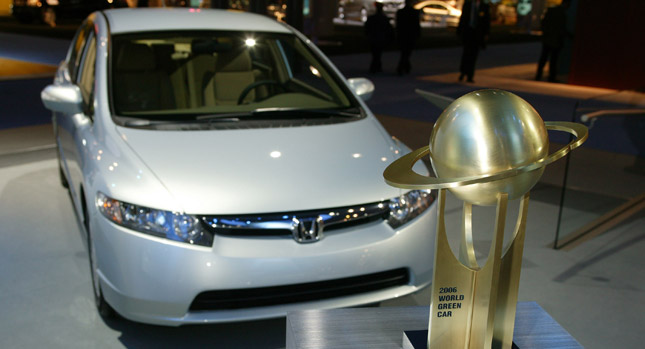Lately, fuel economy figures are becoming something of a hot issue in the U.S. After the Consumer Watchdog-Hyundai Elantra debacle we told you about earlier today, we have another case of a car manufacturer accused of misleading customers about one of its model’s fuel economy claims.
Heather Peters, a former lawyer who lives in Southern California, took Honda to a small-claims court. She accused the carmaker of lying about her 2006 Civic Hybrid’s fuel efficiency as she never managed to reach the estimates advertised by Honda.
 And guess what? Peters won the case and the court awarded her US$9,867. LA Superior Court Commissioner Douglas Carnahan wrote a 26-page decision, which included a long list of misleading statements made by Honda and identified by Peters, such as “amazingly little fuel” and “save plenty of money of fuel with up to 50 mpg during city driving.”
And guess what? Peters won the case and the court awarded her US$9,867. LA Superior Court Commissioner Douglas Carnahan wrote a 26-page decision, which included a long list of misleading statements made by Honda and identified by Peters, such as “amazingly little fuel” and “save plenty of money of fuel with up to 50 mpg during city driving.”
“At a bare minimum Honda was aware… that by the time Peters bought her car there were problems with its living up to its advertised mileage,” Carnahan wrote in the ruling.
Peters, who was naturally delighted with the decision, said she did not file a class-action lawsuit because in small-claims courts, there are no attorney’s fees and cases are decided upon quickly.
She also launched a website at DontSettleWithHonda.org with the intent to inspire other Civic Hybrid owners to dismiss Honda’s class-action settlement that offered owners US$100-200 each and a $1,000 credit on purchasing a new car and choose the small courts option.
Peters said that legal fees in the class action could give lawyers around $8.5 million adding that if the 200,000 people who are covered by the proposed settlement were to sue the Japanese carmaker in a small court, it could cost Honda as much as US$2 billion!
Unsurprisingly, Honda issued a statement concerning the court’s decision today, which it intends to appeal:
“We regret that Ms. Peters is unhappy with the reported mileage for her particular driving experience. However, it is clearly pointed out on the federally required window label that accompanied her car that mileage will vary depending upon a number of factors including options, driving conditions, driving habits and vehicle condition. Those factors affect gas mileage for every car on the road today, hybrid or not. American Honda’s advertising regarding fuel economy of Civic Hybrids was accurate when the vehicles were sold and remains accurate today.
There are a number of points of disagreement with the ruling, but the court stated in error that advertising EPA fuel economy estimates is misleading unless the advertising also explains the effects of stop-and-go driving and the use of air conditioning. In fact, federal law does not permit states or state courts to impose additional requirements of this kind. Thus, a Honda advertisement that accurately referenced EPA mileage estimates, truthfully stated that a driver can get “up to 50 mpg” and carefully noted that mileage will vary is not misleading as a matter of law.
American Honda is proud of the fuel saving capability of the Honda Civic Hybrid and is grateful to the many hybrid owners who have written to let us know how pleased they have been in achieving 50 mpg or more in real world driving conditions. In fact, Honda presented evidence of those customer letters in court to help demonstrate the real world capability of the vehicle. Our customers should rest assured that Honda will continue to pursue cutting-edge technologies and strategies to enhance their ability to achieve high levels of fuel efficiency in all of our products.In conclusion and with all due respect to the court, American Honda believes that the judgment in this case is a radical and unprecedented departure from California and federal law, and, as stated above, we intend to vigorously appeal this decision.”
Ads often make impressive claims in bold letters, while adding certain clauses in the small print – which, surely, almost no one pays much attention. We suspect that this case may start a new storm of lawsuits against manufacturers.
Not to give any ideas […] but some may be inspired to question manufacture claims on things like 0-60 acceleration, braking distance and top speed – well scratch the last one for apparent reasons.
Story References: Detnews & Honda
VIDEO







